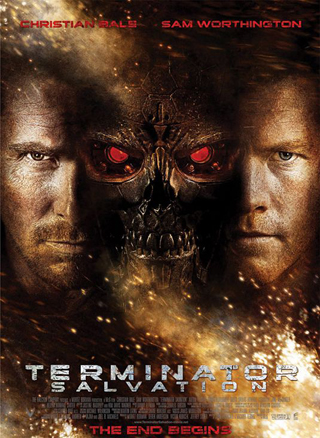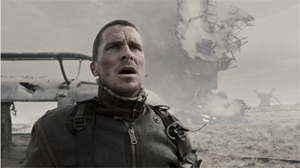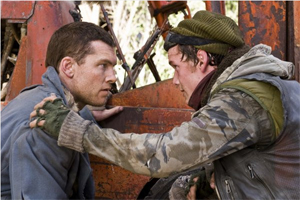|
Terminator
Salvation
After sending
a few Terminators back in time, John Connor has sufficiently
messed with his own timeline to give humanity hope. Trying
to make sense of it, however, can only make viewers' heads
hurt, and that's without trying to figure out if
The Sarah Connor Chronicles should count as canon.
Terminator
Salvation would rather your head not hurt, and so Director
McG and screenwriters John D. Brancato and Michael Ferris
try to keep things hurtling along so fast you won't notice
that their Terminators are better at destroying logic than
humanity. Watch all the action and ignore the huge plot
holes.
Ironically,
this is the first installment in the franchise that doesn't
do any time-traveling at all, and thus should be the most
straightforward. At its heart, it even offers up an intriguing
viewpoint or two. First, we've never really seen the tactical
genius that John Connor (Christian Bale) promised to become,
only the scared young man of the second and third films.
Topping that
off, Brancato and Ferris show the development of a new hybrid,
in the form of Marcus Wright (Sam Worthington). Built like
a Terminator but possessing the soul of his past life, Marcus
awakens in 2018 after being executed in 2003. He knows he's
been out of it for a while, but has a hard time processing
what exactly happened.
The movie starts
off promisingly, with a pre-apocalyptic Marcus agreeing
to turn his body over to science. He's committed some sort
of murder that immediately filled him with regret, probably
fratricide. Dr. Serena Kogan (Helena Bonham Carter), herself
dying of cancer, seems to believe that she can resurrect
Marcus for the greater good of CyberDyne.
It's very, very
lucky that the company was working on this kind of technology
at the same time it was developing SkyNet.
When Terminator
Salvation jumps forward to post-Judgment Day, it splits
its time between Marcus' awakening in a new world and Connor's
trying to establish himself as the messianic leader of the
Resistance. Actually, it's unclear how Connor feels about
that role; Bale grimaces a lot - a lot - but never delves
very deep into what it means to have that weight on his
shoulders.
And that feels
like the greatest loss in this film. It's got its own look,
harshly bright yellows and browns where James Cameron made
his glimpses of the future steely blue. The action scenes
course with cleverness and urgency. There's just nothing
underneath.
Connor listens
to tapes from the past (Linda Hamilton re-recording and
expanding on dialogue from the first two films) and grimaces.
Despite being seen by most of the Resistance as a savior,
Connor gets ignored by the actual military leader General
Ashdown (Michael Ironside) and grimaces. After surviving
a raid on a SkyNet facility, Connor sees his pregnant wife
Kate (a wasted Bryce Dallas Howard) and grimaces. Yet only
he and Kate seem to know about the tapes, and truly understand
that he does know what was to come.
From the other
perspective, we also get young Kyle Reese (Anton Yelchin),
dreaming of joining the Resistance while fighting for his
own survival in Los Angeles. He rescues Marcus from a T-600,
a recognizable endoskeleton that inexplicably wears clothes
but not skin. (For those not in the know, the Arnold Schwarzenegger
model was a T-800.)
Reese, of course,
has a greater role to play, and there should be some tension
with his journeying with Marcus. Instead, they lose each
other and Marcus gains a new guide in the form of pilot
Blair Williams (Moon Bloodgood). She offers us hope that
even if we won't have things like, well, hope, we'll still
have supermodels.
Anything more
would just spoil the plot and its gigantic holes, and in
truth, McG should get his due. The man knows how to push
the right buttons to please the crowd. Several sequences
pay off in visceral thrills, even if it doesn't all quite
add up intellectually. For good or ill, he's also very much
a student of film history, nodding to earlier Terminators
and lifting shots out of movies that have influenced him
- just as he did in the Charlie's Angels movies.
It's a fine
line. Quentin Tarantino does the same thing in his work
and gets hailed as a genius, but he mostly references crappy
films from his childhood. At least McG steals from the best.
He even throws in a mute little girl in homage to Newt from
Aliens, proving that yes, he does love the work of
James Cameron and only wants to add to it.
He's also made
some great choices in his actors. Yelchin has a feral hero-worship
going on that you can easily see growing into the soulful
obsessiveness of Michael Biehn. Bale, of course, commands
the screen, but again isn't offered much of a chance to
do anything. Making a pretty strong splash, Worthington
has likability, charisma and the physique for us to root
for him as a hero, though he does have trouble keeping his
accent from slipping into its native Australian.
And there again,
McG has a weakness. He knows good actors. He just doesn't
seem to know what to do with them. Below those three main
characters, everyone else might as well have been as unexpressive
as Schwarzenegger when he did the first film. Howard has
nothing to do but look concerned. Bonham Carter looks terminal.
Interesting character actors like Common and former NEA
head Jane Alexander barely even register.
Maybe a lot
of scenes got cut for time in favor of making sure this
moved briskly. It sure feels like something's missing, both
in performances and sudden intuitive leaps for characters.
Maybe there's a deeper film waiting for me on Special Edition
DVD.
What made this
a franchise worth exploring - and exploiting - was how it
took what seemed like a shallow popcorn premise and made
it unexpectedly thought-provoking. Twice. We can debate
the third. But this fourth installment seems like a Terminator
itself - it looks and acts like something we should trust,
but underneath, it's cold and soulless. But it's also probably
unstoppable.
|








